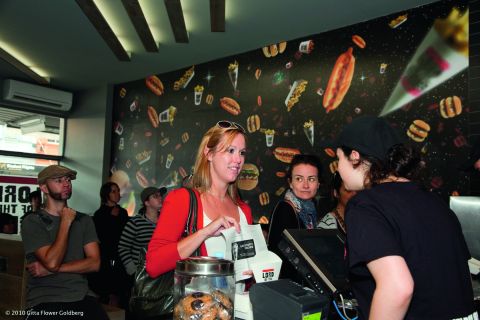
Founders Mark Koronczyk from Melbourne and Canadian Mandy Walker Koronczyk met while living in Taiwan and their late night hunts for snacks sparked the idea of a chip-focused business. Lord of the Fries was created in Melbourne in 2004 as a mobile food van touring different festivals and serving up fries topped with international sauces.
But serving chips is not a new idea, so what marks their business as different? For starters it’s the way the potatoes (Australian grown) are cooked, not from frozen but freshly prepared and cooked in a cottonseed or sunflower oil rather than the heavy beef tallow so often used; chips not with added gluten and not smothered in a watery tomato sauce. The pair also wanted fries that were thick but not too thick, crispy but not too crunchy, delicious and saucy. The resulting offer is chips in a cone for $4.20 with home-made sauces all inspired by flavours found across the globe (sauce of the month might be a Pakistani specialty, a chutney for instance). There are a variety of boxes and sampler sizes too.
Despite the focus on chips, Lord of the Fries’ menu has moved on to incorporate the chips’ best mate with a difference, vegetarian burgers. Now there’s a bigger burger, a jalapeno burger, nuggets and hot dogs – all meat-free. “We are open to everyone. We make an alternative, we’re just improving a product, the potatoes are cooked twice with their skins on, and this sets us apart,” Mark says. “Fries are not the focus elsewhere. People are prepared to pay more for quality and these are good fries. The name draws people in, we get a lot of attention.”
And the name was the idea of Mark’s brother Sam who later came on board to help out with the creative elements and execute the ideas for design and branding.
After being asked time and again by patrons at festivals, “Where can we get your fries during the week?” in 2005 they opened their first store in the CBD, on the corner of Flinders and Elizabeth Street. Now there is a fully franchised Chapel Street outlet, two other stores are franchise joint ventures, two are company-owned.
“We didn’t have much capital to start with. We decided company-owned stores and franchisees would be the way to go. The idea for franchising came from people asking to join us,” explains Sam. When they followed up the franchising idea, the benefits were obvious: harnessing a strong work ethic with people prepared to give their all and spend time in the business. The difficulty of getting trusted management staff for the stores enhanced the appeal of owner operators.
“It’s a good operation but you have to work in it, check what the staff are doing and check if the store is clean. If you put in a manager you just add capital,” says Sam.
“We’re looking for franchisees who are not afraid to say they don’t know everything,” adds Mandy, who cites good people skills and confidence as key franchisee qualities.
Franchisees will be buying a turnkey operation ($275,00 to $365,000), will receive training for about two months in other stores (learning cash register skills, kitchen skills, daily reconciliation, bookkeeping and supply skills). Once the franchisee is set up, the operations manager will spend the first three weeks with them. And a bonus for those franchisees who need that extra fillip, experienced staff can be sourced for the first few weeks. Of course, there is ongoing support and training, Mandy emphasises.
Right now the stores work in either strip or mall locations, but in fast food clusters, so they benefit from sites next to Hungry Jacks, KFC and McDonald’s. The plans are for further outlets around Melbourne and then interstate and within five years the company wants a national and international presence. They’re keen but cautious. The product is perfect for global development, Sam says. “It’s quite a unique offer, it’s vegetarian, halal and kosher, so it’s quite attractive in places like India. This is a long term project but you can’t jump in without doing due diligence. We learned that from our two years in the mobile van.”

